
Dear Readers,
Mahendras has started special quizzes for IBPS & SBI Exam so that you can practice more and more to crack the examination. This IBPS & SBI Exam special quiz series will mold your preparations in the right direction and the regular practice of these quizzes will be really very helpful in scoring good marks in the Examination. Here we are providing you the important question of reasoning ability for the IBPS & SBI Exam.
Q.1-5. Study the following information carefully and answer the questions given below.
Seven persons O, P, H, T, U, D and S are sitting in a row and facing towards North direction, but not necessarily in the same order.
O who is not at any end of the row, is immediate neighbour of U. D is third to the left of S who is not left side of H. Only two persons are between U and P. U is second from right end of a row.
नीचे दी गई जानकारी का ध्यानपूर्वक अध्यन करके नीचे दिए गए प्रश्नों का उत्तर दीजिए।
सात व्यक्ति O, P, H, T, U, D और S एक पंक्ति में उत्तर दिशा की ओर मुख करके बैठे हैं लेकिन जरूरी नहीं कि इसी क्रम में।
O जो पंक्ति के किसी भी छोर पर नहीं है, U का तुरंत पड़ोसी है। D, S के बाएं तीसरा है जो H के बायें ओर नहीं है। U और P के बीच में केवल दो व्यक्ति है। U पंक्ति के दाएं छोर से दूसरा बैठा है।
Q.1. Who is second to the right of H?
1. Either S or D
2. P
3. S
4. O
5. None of these
H के दाएं दूसरा कौन है?
1. या तो S या D
2. P
3. S
4. O
5. इनमें से कोई नहीं
Q.2. Which of the following is true regarding U with respect to S?
1. U is immediate left of S.
2. U is immediate right of S.
3. U is second to the right of S.
4. U is second to the left of S.
5. Cannot be determined
निम्नलिखित में से कौन सा S के सापेक्ष U के संबंध में सही है?
1. U, S के तुरंत बाएं है।
2. U, S के तुरंत दाएं है।
3. U, S के दाएं दूसरा है।
4. U, S के बाएं दूसरा है।
5. निर्धारित नहीं किया जा सकता
Q.3. How many persons are sitting between O and D?
1. One
2. Two
3. Three
4. Five
5. None of these
O और D के मध्य कितने लोग बैठे हैं?
1. एक
2. दो
3. तीन
4. पाँच
5. इनमें से कोई नहीं
Q.4. If P and S interchange their places to each-other then who is to the immediate right of P?
1. O
2. D
3. H
4. T
5. None of these
यदि P और S अपने स्थान परस्पर बदल लें तो P के तुरंत दाएं कौन हैं?
1. O
2. D
3. H
4. T
5. इनमें से कोई नहीं
Q.5. If only H is to the left of D then which two persons are seated at the ends of a row?
1. D, either T or S
2. T, either S or D
3. T U
4. O D
5. T H
यदि केवल H, D के बाएं छोर है तो कौन से दो व्यक्ति पंक्ति की छोर पर बैठे है?
1. D, या तो T या S
2. T, या तो S या D
3. T U
4. O D
5. T H
Q.6-10. In each question two/three statements are followed by two conclusions numbered I and II. You have to take the given statements to be true even if they seem to be at variance with commonly known facts. Read all the conclusions and then decide which of the given conclusions logically follows from the given statements disregarding commonly known facts.
1. If only conclusion I follows.
2. If only conclusion II follows.
3. If either conclusion I or II follows.
4. If neither conclusion I nor II follows.
5. If both conclusions I and II follow.
प्रत्येक प्रश्न में दो/तीन कथन के बाद दो निष्कर्ष I और II दिए गए हैं। निष्कर्षों को पढ़कर (चाहे वे सामान्यतया सही तथ्यों से भिन्न क्यों न हों) आपको यह तय करना है कि कौन से निष्कर्ष तार्किक रूप से अनुसरण करते हैं। आपको कथन में दी गई जानकारी को सत्य मानते हुए दोनों निष्कर्षों में से तार्किक रूप से सही निष्कर्ष का चयन करना है।
1. यदि केवल निष्कर्ष I अनुसरण करता है।
2. यदि केवल निष्कर्ष II अनुसरण करता है।
3. यदि या तो निष्कर्ष I या फिर II अनुसरण करता है।
4. यदि न तो निष्कर्ष I और न ही II अनुसरण करता है।
5. यदि निष्कर्ष I और II दोनों अनुसरण करते हैं।
Q.6. Statements:
All players are smokers.
Only a few smokers are wine.
Conclusions:
(I) All smokers are players.
(II) Some wine are smokers.
कथन :
सभी खिलाड़ी, स्मोकर्स हैं।
केवल कुछ ही स्मोकर्स, शराब हैं।
निष्कर्ष :
(I) सभी स्मोकर्स, खिलाड़ी हैं।
(II) कुछ शराब, स्मोकर्स हैं।
Q.7. Statements:
No road is south.
Only a few south are jump.
Some jump are not letter.
Conclusions:
(I) Some letter not being jump is a possibility.
(II) Some road are letter.
कथन :
कोई सड़क, दक्षिण नहीं हैं।
केवल कुछ ही दक्षिण, कूद हैं।
कुछ कूद, अक्षर नहीं हैं।
निष्कर्ष :
(I) कुछ अक्षर के कूद न होने की एक सम्भावना हैं।
(II) कुछ सड़क, अक्षर हैं।
Q.8. Statements:
Only a few women are ministers.
Only ministers are simpletons.
Conclusions:
(I) All women being simpletons is a possibility.
(II) Some ministers are not simpletons.
कथन :
केवल कुछ ही औरत, नेता हैं।
केवल नेता, बुद्धू हैं।
निष्कर्ष:
(I) सभी औरत का बुद्धू होने की एक सम्भावना हैं।
(II) कुछ नेता, बुद्धू नहीं हैं।
Q.9. Statements:
Some cars are trains.
All car are vehicles.
Conclusions:
(I) All trains are not vehicles.
(II) Some trains are vehicles.
कथन :
कुछ कार, ट्रेन हैं।
सभी कार, गाड़ी हैं।
निष्कर्ष :
(I) सभी ट्रेन, गाड़ी नहीं हैं।
(II) कुछ ट्रेन, गाड़ी हैं।
Q.10. Statements:
No road is south.
Only a few south are jump.
Some jump are not letter.
Conclusions:
(I) Some jump being roads is a possibility.
(II) All south being letter is a possibility.
कथन :
कोई सड़क, दक्षिण नहीं हैं।
केवल कुछ ही दक्षिण, कूद हैं।
कुछ कूद, अक्षर नहीं हैं।
निष्कर्ष :
(I) कुछ कूद का सड़क होना एक सम्भावना हैं।
(II) सभी दक्षिण का अक्षर होना एक सम्भावना हैं।
ANSWER-
Q.1-5.

Q.1. 3
Q.2. 3
Q.3. 3
Q.4. 1
Q.5. 5
Q.6. 2
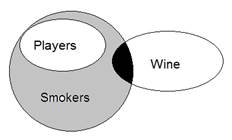
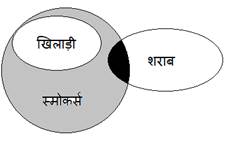
Q.7. 1
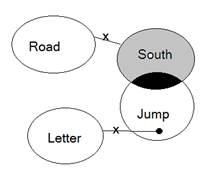
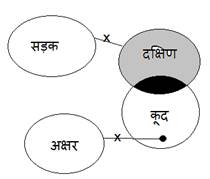
Q.8. 4


Q.9. 2
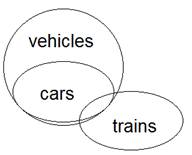
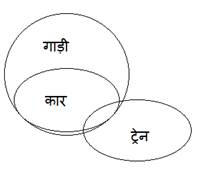
Q.10. 5 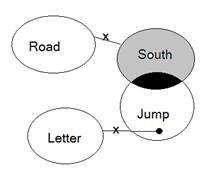
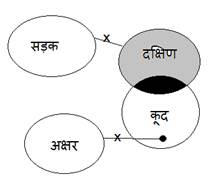






0 comments:
Post a Comment
MAHENDRA GURU